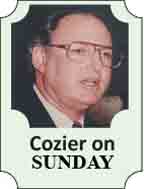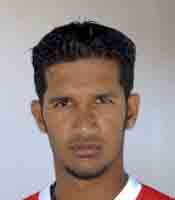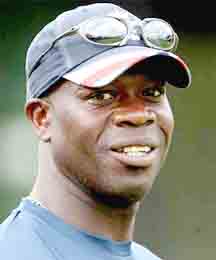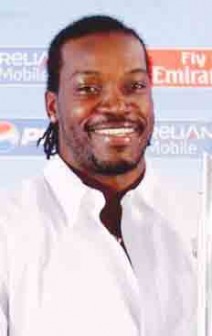There was the good and the bad during the week for West Indies cricket desperate to show that its present, and future, is not as bleak as it seems.
In their first two matches of the T20 Champions League in Hyderbad on Monday and Tuesday, the Caribbean champions, Trinidad and Tobago, displayed the same self-belief, team spirit and incisive leadership that carried them unbeaten to the final of the inaugural 2009 tournament.
 Without their two most high profile players, Keiron Pollard and Dwayne Bravo, who preferred to turn out for their Indian Premier League (IPL) franchises, their victories over Sri Lanka champions Ruhuna and English champions Leicestershire were even more unexpected than their 2009 advance, that is by all but the players themselves.
Without their two most high profile players, Keiron Pollard and Dwayne Bravo, who preferred to turn out for their Indian Premier League (IPL) franchises, their victories over Sri Lanka champions Ruhuna and English champions Leicestershire were even more unexpected than their 2009 advance, that is by all but the players themselves.
The opposition to come in the main draw is bound to be tougher but so it was in 2009.
Come Friday, at the Oval in London, a makeshift West Indies team, severely depleted by the absence of the five Trinidadians who would otherwise have been there, were soundly thrashed by 10 wickets in a T20 International by a new-look England team.

“Pitiful” and “like men against boys” were the descriptions used by one English writer who passed through the West Indies’ greatest days more than two decades ago. Other comments closer to home were even more caustic.
To be fair, the situation needs to be put into context.
Quite apart from the loss of the Trinidadians in India (and, in more favourable times, Chris Gayle and Dwayne Bravo), no West Indian had a T20 match since June 4, against India, and no cricket at all since the final Test of that series on July 10. For seven of the starting 11, it was their first appearance in England.
In contrast, England’s players had spent an entire summer involved in matches of every length, not least those of 20-overs an innings on which all of their young guns are now raised.
Yet all of this does not explain the West Indies glaring lack of the basics.
The batting fraility led to all 10 wickets tumbling for 76 after the new opening pair, Dwayne Smith and the debutant Johnson Charles, had rattled up 51 off the first six powerplay overs. “Calypso Collapso” was the old cliché revived by Nsser Hussain in tv commentary.

When England replied, indisciplined bowling gave away five no-balls (with two sixes off the resulting free hits), three by spinners Devendra Bishoo and Nkrumah Bonner.
And then there was the slack fielding.
Contrast this with Trinidad and Tobago’s performance in Hyderabad.
Against the Sri Lankans, they required 58 to win off 6.1 overs with all their big guns (Lendl Simmons, Adrian Barath, Darren Ganga, Densh Ramdin) gone. Darren Bravo remained but was in go-slow mode at the time. It seemed a lost cause but such phrases apparently do not figure in their vocabulary.
So Sherwin Ganga arrived to fashion an extraordinary innings that not even his more famous elder brother might have believed he was capable of.
With a succession of clean, orthodox shots – none better than the cover drive that secured victory – he stroked two sixes and four fours in 39 of 15 balls. Trinidad and Tobago were home with seven balls to spare.
The next match provided an example to the West Indies on Friday. It wasn’t followed.
Simmons and Barath, out for 3 and 0 against Ruhuna, ensured that it wouldn’t happen again.

They batted into the 18th over building a record T20 wicket partnership of 139 on the way to 168 for two. Rampaul and Samuel Badree, with his phantom, wicket-to-wicket leg-spin, then undermined Leicestershire and, at 21 for five, victory was assured.
What followed in London on Friday was a depressing anti-climax. No one would be more disappointed than head coach Ottis Gibson.
In the circumstances, there is no way that he can be judged on one result. Yet he knows full well how precarious is the coach’s tenure in any sport when his team starts losing, Even as successful a team manager as Arsenal’s Arsene Wegner has felt the heat this season.
Given the nature of West Indies cricket, Gibson has been under pressure ever since he came to the post two years ago. At present, it involves his still unsettled dispute with Chris Gayle, the involvement of several CARICOM heads and the criticism of almost every internet blogging Tom, Dick and Harry for whom this is another bandwagon for them to jump on.
He is a strong character who has set himself the task of bringing back discipline to the team, even if it means standing firm in disagreements with its most prominent players, such as Gayle.
It is high time that burden was removed so that he and Gayle know, once and for all, where they stand and can act accordingly.
The West Indies Cicket Board (WICB) which has let it drag on since April, announced last week that the management will submit a report to the board of directors after which a conclusive statement will be made,” It didn’t state when.
While Gibson awaits the verdict, he could do with some success on the field, starting with the final T20 Internatonal against England today.








